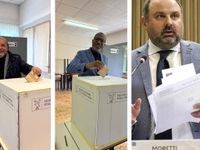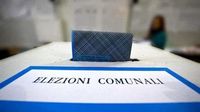The municipal elections in the Friuli-Venezia Giulia region of Italy have concluded, with results indicating significant shifts in local governance. On April 15, 2025, the vote count was underway in four municipalities: Pordenone, Monfalcone, San Pier d’Isonzo, and Nimis. These elections, held over the weekend from April 13 to April 14, were necessitated by the premature dissolution of local councils.
Voter turnout across these municipalities was reported at 53%, with 36,265 voters casting their ballots out of 68,907 eligible voters. The participation rates varied significantly, with Monfalcone showing the highest turnout at 57%, followed by San Pier d’Isonzo at 61%, Pordenone at 51%, and Nimis at a mere 44%.
In Pordenone, a key municipality and provincial capital, the election saw Alessandro Basso from the Fratelli d’Italia party leading with 53% of the votes as results from 20 out of 51 sections were counted. His main rival, Nicola Conficoni from the Democratic Party, trailed with 36%. Other candidates included Anna Ciriani, who garnered only 2.6% with her list “#AmiAmoPordenone,” and Marco Salvador with 7.7% from his civic list. If no candidate achieves at least 40% of the votes, a runoff will be held on April 27 and 28.
Meanwhile, in Monfalcone, Luca Fasan, also from the center-right coalition, was poised for a decisive victory, securing approximately 70% of the votes with 33 sections counted. His closest competitor, Diego Moretti from the center-left, managed only 26%, while Bou Konate from the “Italia Plurale” list, representing foreign candidates, received about 3%. Fasan’s victory is notable as it signals a continuation of the policies established by the former mayor, Anna Maria Cisint, who has now transitioned to the European Parliament.
The elections in San Pier d’Isonzo were triggered by the death of the previous mayor, Claudio Bignolin, in October 2024. Denise Zucco, representing the center-left, was leading with 71% of the votes against Alex D’Aronco’s 28.8%. The turnout in this municipality was commendable, particularly given the circumstances leading to the election.
In Nimis, the elections were prompted by the resignation of nine out of twelve councilors, leading to the collapse of the previous administration. Fabrizio Mattiuzza emerged victorious with 63.5% of the votes, defeating Sergio Bonfini, who received 36.4%. The turnout in Nimis was low at 44%, mirroring the previous election cycle.
As the dust settles on these elections, the implications for local governance in Friuli-Venezia Giulia are profound. The center-right coalition appears to have solidified its power in key municipalities, which may influence regional policies moving forward. The results reflect a broader trend of shifting political allegiances among voters, emphasizing the importance of local issues in shaping electoral outcomes.
In Monfalcone, Fasan expressed gratitude towards his supporters, attributing his success to the groundwork laid by Cisint. He stated, "I expected a good result, but I didn’t think I’d exceed 70%: I’m truly very happy." His victory speech highlighted the need for continuity in governance and the importance of addressing local community needs.
Conversely, Moretti lamented the campaign’s focus on personal attacks rather than substantive policy discussions. He noted, "Instead of talking about programs for the future, the left wanted to turn this administrative vote into a referendum against our security policies." This sentiment reflects a growing divide in local political discourse, where personal and party identities increasingly shape voter preferences.
The election results will not only determine the immediate governance of these municipalities but also set the stage for future political dynamics in the region. The center-right’s strong showing may embolden its agenda, particularly in economic development and public safety, which have been focal points of their campaigns.
As attention now shifts to the potential runoffs in Pordenone and Monfalcone, the next few weeks will be critical in determining how these municipalities will navigate their political landscapes. With voter engagement remaining a key factor, local leaders will need to address the concerns of their constituents effectively to maintain support in future elections.
Looking ahead, the implications of these elections extend beyond immediate governance. The results may influence the political landscape of Friuli-Venezia Giulia, particularly as parties recalibrate their strategies in response to voter sentiments. The upcoming runoff elections will be pivotal in solidifying or altering the current political balance.






